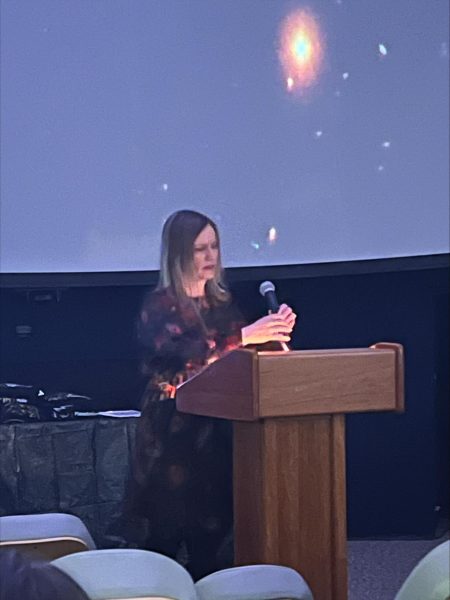
NKU students, professors and the surrounding NKU community gathered on Wednesday, March 13 to share at the Loch Norse open mic beneath the stars.
The atmosphere of Haile Planetarium was buzzing with excitement as about 70 people filled the room waiting for the second collaboration of art and science to begin.
The lights soon dimmed as English professor and Loch Norse advisor Kelly Moffett was introduced. She began to share the beginnings of a new project she’s working on.
“Last October, I traveled to Heidelberg, Germany for a big project I am doing about the mentally ill who were killed by the Nazis,” Moffett said. “It was a really profound experience to be in the presence.”
She further explained how Hans Prinzhorn, a German psychiatrist and art historian, collected art from mental patients in a book he published titled“Artistry of the Mentally Ill.”
“Many have mixed feelings about the book and the collection since it is hard to tell if the patients were able to give permission or even in some cases if their permission were sought at all,” Moffett explained. “But on the other hand, we know their stories through the art they left behind.”
Moffett continued by sharing the stories of Gertrud Fleck, a patient of Pirna-Sonnenstein asylum and victim of the Nazi death camps, along with August Natterer, a German outsider artist who was hospitalized after experiencing delusions, with the help of the planetarium showing pictures of the artists and their work.
“He saw images in the horizon he believed were “revealed to him by God for the completion of salvation.” Moffett explained. “This led to his life-long commitment to an asylum.”
She explains how researching for this project led to her poetry that she shared at the event.
“So, while researching for one project, a prose project, I ended up becoming so invested in the art of the patients and poems started coming in response to them,” said Moffettbefore reading her first poem titled “Some Say Angels.”
She went on to talk about more people, specifically Anges Richter, a seamstress who spent the last 25 years in an asylum and who’s known for their jacket. This moment was one that turned a few heads like Autumn Howard, a senior English creative writing major.
“I really enjoyed her connection with the asylum patients, and I loved the jacket,” Howard said, “I thought it was really good.”
Moffett continued and read some more poems based around other people’s stories like Paul Goetch, an architect whose building designs were deemed “unbuildable,” and August Klett, a wine merchant who created an “elaborate system of communicating through a different kind of alphabet.” These poems were titled: “Long After Being a Child, Really” and “This would be my Love Letter.”
She ended her reading with a piece called “Another Attempt at a Love Poem or Mom Sent Her,” which had the audience laughing along with Moffett’s mentions of slugs and as she left the podium displayed on the screen was the poem titled “A necessary belief” written by Moffett and published in her chapbook titled “Just After.”
“As if sanity hid my hands/all this time, small as a chickadee/egg and messy like a plum.”
Following the event, Moffett explained that the choice to use the planetarium was to show images to go along with the readings.
“I thought this would be the perfect environment to project that art because it’s on the planetarium wall,” Moffett said. “So I thought that this probably would be the perfect project for this space.”
Moffett’s comments about the planetarium were shared by numerous people, including Howard.
“I feel like with the lights off it just drew my attention to her and what she was reading. I definitely enjoyed the open mic being in there,” Howard said.
Each reader was able to choose a visual from the night sky to accompany them as they read their piece(s) and it became a unique part of their performance. Christa Speights, director of the Haile Planetarium, was in charge of displaying the different visuals between each piece.
Readers were asked what their favorite planet or space object was, and some readers chose specific stars, like Butterfly Gibbs’ choice of Betelgeuse and Arcturus, or planet, like Finn Huff’s choice of Saturn. Other students preferred to decide based on how it could better add or represent their poem to the audience like with Ezra Knapp’s choice of the Cat’s Eye Nebula.
Speights expressed how much she enjoyed helping the readers by working on the planetarium projectors.
“It was so much fun! I mean, I really enjoyed it,” Speights said. “I loved hearing all the poetry and going to different places. I would love to do it again.”
Though this wasn’t the first time that readers were able to use the planetarium with their pieces.
“So last year, there was a person doing their readings about Polaris, the North Star, “So Kelly was like where could we do it that would be a cool venue?” Speights said. “So, that’s how it ended up here last year, and everybody loved it.”
The collaboration beneath the stars seems to still be a big hit on campus and to the community outside of campus.
“People were so shocked at the open mic, and especially if they’re coming out of town or their community members. They often come to me and are like ‘wow, that open mic.’ And I’m like ‘yeah’,” Moffett said.

